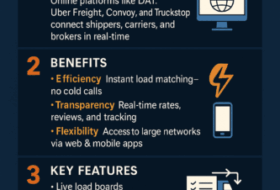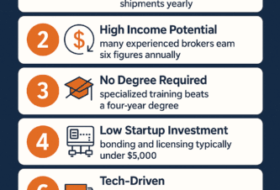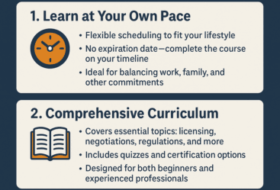Certified Freight Broker
Discover the essential steps to become a certified freight broker, the skills necessary for success, and the importance of industry-recognized certifications. Join us as we delve into the world of freight brokerage, guiding you towards a fulfilling and prosperous career in this dynamic field.
Introduction to Freight Brokerage
The freight brokerage industry is a crucial component of the global supply chain, acting as the pivotal link between shippers and carriers. But what exactly does a freight broker do, and why is proper training and certification so vital? In this comprehensive guide, we delve into the world of freight brokerage, outlining the steps to become a certified broker, the skills necessary for success, and the industry’s future.
The Path to Becoming a Certified Freight Broker
Before you can broker freight deals, you need to understand the educational and professional requirements. While a high school diploma is the minimal educational threshold, higher education in logistics or supply chain management can give you a significant edge. Professional training programs, whether online or in-person, provide specialized knowledge and are a stepping stone towards certification.
Understanding Freight Broker Certification
Why should you get certified? Certification is not just a piece of paper; it’s a testament to your commitment and expertise in the field. Recognized certification bodies, like the Transportation Intermediaries Association (TIA) and the Federal Motor Carrier Safety Administration (FMCSA), set the industry standards and validate your professional credibility.
Becoming a certified freight broker involves several steps, including meeting certain requirements and obtaining the necessary documentation. Here is a general guide to help you through the process:
- Meet Basic Requirements:
- Be at least 18 years old.
- Be a legal resident of the United States.
- Possess a high school diploma or equivalent.
- Gain Industry Knowledge:
- Familiarize yourself with the transportation and logistics industry.
- Understand the role and responsibilities of a freight broker.
- Complete a Freight Broker Training Program:
- Enroll in a reputable freight broker training program. These programs often cover relevant topics such as regulations, licensing, and industry practices.
- Obtain a USDOT Number:
- Register for a USDOT (United States Department of Transportation) number through the Federal Motor Carrier Safety Administration (FMCSA). This is required for businesses involved in interstate commerce.
- Acquire a Motor Carrier (MC) Number:
- Apply for an MC number from the FMCSA. This is necessary for brokers and freight forwarders.
- Secure a Surety Bond or Trust Fund:
- Obtain a surety bond or trust fund in the amount required by the FMCSA. This financial responsibility ensures that you will fulfill your obligations as a freight broker.
- Designate a Process Agent:
- Choose a process agent for each state in which you operate. A process agent accepts legal documents on your behalf in case of legal issues.
- Submit the FMCSA Application:
- Complete and submit the OP-1 application form on the FMCSA website. Pay the required fee for processing.
- Wait for Approval:
- The FMCSA will review your application, and upon approval, you will receive your MC number.
- Renew and Maintain Certification:
- Freight broker certifications need to be renewed periodically. Stay informed about renewal requirements and ensure compliance.
- Consider Additional Certifications:
- While not mandatory, obtaining certifications from reputable organizations in the logistics industry can enhance your credibility and marketability.
- Build Relationships with Carriers and Shippers:
- Establish relationships with carriers and shippers to build a network of contacts. This is crucial for success in the freight brokerage business.
It’s important to note that regulations and requirements may change, so it’s advisable to check with the FMCSA and other relevant authorities for the most up-to-date information. Additionally, consider consulting with legal and business professionals to ensure compliance with all applicable laws and regulations.
Essential Skills for Freight Brokers
As a broker, you’ll need a mix of negotiation acumen, communication prowess, and a knack for networking. But it’s not just about the soft skills; you also need to understand the nitty-gritty of logistics and stay abreast of technological advancements that can streamline your operations.
Launching Your Freight Brokerage Career
Getting your foot in the door might start with internships or entry-level positions, but it doesn’t end there. For the entrepreneurial spirit, starting your own brokerage is the ultimate goal. This requires not only a deep understanding of the industry but also a keen sense of business, covering everything from legal know-how to client acquisition strategies.
The Future of Freight Brokerage
The freight brokerage landscape is continuously evolving, with technology paving the way for more efficient, sustainable practices. Staying informed on industry trends is not just beneficial; it’s essential for anyone looking to make their mark in the field.
Conclusion
Embarking on a career as a freight broker is both challenging and rewarding. With the right training and certification, along with a set of well-honed skills, you can become a pivotal player in the logistics industry.
Growth + Change = Opportunity! How are you going to capitalize on the opportunity as a freight broker, agent, dispatcher or box truck carrier?







